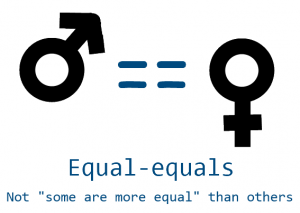Normally when I write a blog I get flack for being too wordy, so I suppose it is nice that my post about sexuality education within the church left people wanting more, and more specifically, wanting solutions to the problem.
I suppose part of the reason I didn’t offer a solution is because…well…I don’t have one, nor do I feel as though I am qualified enough to offer one. I could throw out some vague sort of theory, but what would that benefit anyone? As one reader so aptly put it, “Like any good Mormon make out, this left me Unsatisfied and sore.” Funny and observant, though absolutely not my intention, and I wouldn’t want any half-bake solution I came up with elicit the same response.
I think it is also important to acknowledge that while some people will identify with what was written, there are also some who will not. As we have seen from the initial responses to the post, not everyone agrees with my observations. I would expect nothing less, for this is what it means to be human and individuals who experience the world, life, the doctrine, and the church in profoundly different ways.
I have had people tell me that their experience in the church is nothing like the one I have described, and to them I would say….well…yeah. I wouldn’t expect that my take-away is going to be the same as your take-way or her take-away or his take-away. Even if we were all receiving the same information, we might all glean different interpretations. This is the folly of human language and communication. Take 10 different people and teach them the exact same lesson, in the exact same words, and it is quite possible that each of those 10 people will come away from the lesson with 10 different opinions, insights, and feelings on what they were just taught.
So when people ask for simple solutions, or even complex ones, it is important to remember that no matter how seemingly simplistic and streamlined the curriculum, you are always going to encounter situations where the intended outcome of the teacher is not achieved. There are always going to be times when you say “apple” and people hear “orange”. This is what makes organized religion difficult for us humans. We have plenty of examples of people reading from the same holy book, and coming away from those readings with vastly different opinions of how that book is telling them to live and conduct their lives.
Our LDS faith is no exception.
We may think we understand the general principles or “Big Picture” behind many of the things we are taught, but that doesn’t prevent some of us from being unknowingly affected by how that message was presented.
To illustrate me point, I will use a non-religious example.
Let’s say 3 people are sitting at home watching TV and they all happen upon a documentary about the health benefits of Olive Oil, and conversely, the health detriments of Synthetic Oils. All 3 people just received the same information, and yet each of these 3 might very well have entirely different responses to said information. The first person might be so moved by the information that they immediately go into their kitchens and throw out everything and anything that contains even trace elements of synthetic oils. The second person might hear the message and conclude that they are going to make a conscious effort to attempt to avoid synthetic oils and also try and add more olive oil into their diets whenever it is convenient to do so. The third person might hear the information and question the validity of it, which might cause them to dismiss the information entirely.
So often, the issue is not with the message, but with the individual receiving the message. This is why human communication is one of the most frustrating and complex issues we face. In order to function as a cohesive society, or family, or marriage, or church, we need to have communication. In order to teach our children good and decent principles, we must have communication and curriculum, even if it isn’t perfectly received.
I don’t for one moment believe that the church is intentionally trying to teach men and women to fear or mistrust one another, nor do I believe that it is the churches intention to make men and women feel shame about their own sexuality. All I can do as an observer of human behavior is look at the message, look at what I believe is the intended desired result, and then look at what the actual result of receiving the message is in reality.
In the case of sexuality, what I hear are the same Sunday School lessons that I assume most of you have heard. I assume this because the church has issued specific curriculum in specific manuals to be taught on specific days. What I believe these messages are attempting to do is convey the idea that sexual intimacy between a man and a woman is sacred, and that it is the preference of our Father in Heaven that it only be shared within the bonds of marriage. What I believe is the intended desired result of those teaching these concepts is for the hearer of the message to want to save these experiences for marriage. What I observe as far as the actual result of this message is as varied as the individuals who hear them.
For some not all, this message does exactly what I believe it was intended to do. It doesn’t make them hate themselves or their sexuality, and it doesn’t pit them against the opposite gender, but for some not all this is unfortunately exactly what it does.
So what can we do?
One possible solution would be to change the actual language we use when we talk about sexuality. Keep the bits about the sacred nature of human sexuality, but also stress the importance of embracing and cultivating your own sexuality. But see, I’m assuming that even that last sentence made some of you squirm.
“What does she mean by cultivate your own sexuality? Is she suggesting that we tell our children to explore and….you know….with their own bodies?”
Well see here is the pickle, most of the research on happy human development says that it is perfectly natural, and yes, even beneficial for men and women to touch and explore and engage in a certain amount of self-love. There are even therapists, psychologists, and behavioral scientist within the LDS community that believe that the church should ease off on the whole No Masturbation Ever stance, and maybe some day they will.
This is just one example of why finding a simple solution is not so simple after all.
For many people, fixing the problem appears to include having to change the stance or even the doctrine of the church. How can you tell a person to explore their own sexuality when every time they do they have to go and talk to their bishop? It’s a sticky wicket to be sure. If the goal is total abstinence to anything sexual before marriage, then we should expect to continue to see some or many who end up in the situation that I described in the previous post. Certainly we could work on the words, tone, inflection, and emotion by which we convey the message, but so long as the message itself remains the same, there is always going to be the less desired outcome. It doesn’t make the message wrong, and it doesn’t mean we should stop teaching it.
It is possible that the message does need to change in some areas, but in doing so, there would needs be a shift in the way that most of us have been taught to approach the topic of sexuality. Is this something the church should do? I suppose you could make arguments on either side, but for right now, the doctrine is the doctrine and we have to work with what we have been given.
My only suggestion is that we allow for more open and candid discussion. I know that for many this is a sacred topic, but I believe it would be highly beneficial for those who sit in the highest positions of authority within the church to begin a frank and open dialogue on the matter. We now live in a world that is saturated with sexuality. It is on our billboards, in our media, and being sold to us on bottles and on our food packages.
The world is teaching one idea about sexuality, and they are not afraid to be very blunt about their perspective, and as such, in their own unique and respectful way, I believe that it would be beneficial for the church to address the topic with the same amount of specificity. This might be difficult at first, especially for those who come from generations that believe that sex and sexuality is not something to be discussed so candidly. We shouldn’t allow the world to dictate the message, but with the changing times and changing communications, the church must find ways to adapt to how we communicate the message.
There is an open and respectful way to approach these topics. There are ways to teach responsible sexuality that don’t include personal shamming practices. If we want to embrace these new methods of teaching then we need to reach out to the experts. We need to allow those thoughtful and faithful latter-day scientists, therapists, physiologist, and so on to teach us how to better talk with our children and with each other about these critical topics. These LDS experts are out there, and they are trying to help and make their voices heard. Here at the Cultural Hall we have personally interviewed some of these individuals. If you are looking for specific real world solutions, I would highly recommend and encourage that you talk to those who have dedicated their lives to these very specific topics. They will be able to give you much more concise answers than I ever could.
I have hope that through these efforts we can begin to see a turn towards better mental/emotional/spiritual health for the saints when it comes to this delicate and critical topic.


Richie, it says that you posted this but the author is clearly female. Who wrote this? Or did you decide to take on a female persona? 🙂